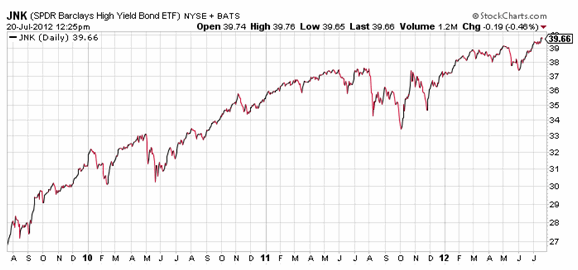The junk bond rally – and the whole investment grade corporate bond rally for that matter – can be looked upon from two opposing viewpoints. The optimists will tell you that it is a sign of underlying strength in the economy, denoting the fact that US creditors are comfortable with the risks involved with lending to these companies. The pessimists will tell you that the creditors will be proven foolish and eventually lighter in the wallets, so who cares what their willingness to lend may signal?
Below I’ve got a smart take from both an optimist and a pessimist on the junk bond rally and the fact that investors in the high yield market are DTF (Down to Finance):
First, here’s Ryan Detrick, Chartered Market Technician (CMT) and Senior Technical Strategist at Schaeffer’s Investment Research:
With that said, there are still two areas holding up well that make me think the economy won’t tank, and could very well improve drastically during the second half of the year. Housing and junk bonds are both showing some major improvements, and this is definitely an encouraging sign. The majority of the housing data over the past two months has been very positive. In fact, housing starts in June came in at their highest level in three years. Turning to junk bonds, they can be a very good gauge of economic growth. Think about it — these are bonds on the riskiest of companies, and improvements here show an appetite for risk. Why would anyone buy bonds if you think the company paying would just default? Right now, various junk bonds are breaking out — suggesting the economy could be on much better footing than most give it credit for.

A perfectly reasonable, logical and historically accurate line of commentary.
But then there’s this bit on how the junk rally is a massively obvious bubble, from Stephanie Pomboy (MacroMavens), who was quoted extensively in this weekend’s Barron’s:
And Stephanie’s nothing if not adamant that the junk portion of the bond market meets “all the standard criteria of a bubble.” She cites, by way of illustration, the fact that junk yields are now “hovering around the all-time lows notched in 2005 — the absolute peak in the greatest asset bubble and credit-financed expansion of our lifetimes.”
Further evidence of the junk-bond bubble if you harbor any doubts on that score is that, according to the EPFR Global, in the first quarter of this year investors put a hefty $33 billion into high-yield bond funds — four times as much as they bought in all of 2011. In the past three years, assets of junk bond funds have more than doubled.
And when the bubble bursts, as Stephanie believes it inexorably will, among the likely big losers are Jane and John Q. who saw junk as a way to possibly recoup some of their vicious real-estate and stock-market losses, and insurance companies, the biggest holders of corporate debt and the largest counterparties in the derivatives market.
And pension funds are front and center on the endangered list, having, as Stephanie notes, “loaded the boat with junk in a desperate attempt to meet 8%-plus return assumptions in a 1.5% risk-free world.”
Please bear in mind that Stephanie’s “Hear Me Now, Believe Me Later” newsletter from March of 2006 was one of the most frighteningly prescient pieces of market forecasting ever written. It was the ultimate spoiler alert, written in a runaway bull market no less, about how the housing bubble was going to collapse and destroy the economy on its way down.
No it is very possible, of course, that they are both right (as they would have been at the prior record low-yields for junk from back in 2005). In that example we did, of course, get quite a solid 18 months out of both the stock market and the economy before the eventual collapse began in late 2007. And so in in the case of 2005, both the optimists and pessimists would have been right on the high yield market and it’s meaning. Junk bonds rallying was both a sign of strength and a distant early warning about the quality of liquidity splashing about back then.
But what does the junk bond rally mean this time around? Is the dour take from Stephanie correct or is Ryan’s citation of healthy financing for junk one more sign that the recovery is still alive and well under the surface?




… [Trackback]
[…] Find More Info here to that Topic: thereformedbroker.com/2012/07/23/junk-bond-investors-are-dtf/ […]
… [Trackback]
[…] Here you will find 68940 additional Information on that Topic: thereformedbroker.com/2012/07/23/junk-bond-investors-are-dtf/ […]
… [Trackback]
[…] Find More Information here on that Topic: thereformedbroker.com/2012/07/23/junk-bond-investors-are-dtf/ […]
… [Trackback]
[…] Find More here to that Topic: thereformedbroker.com/2012/07/23/junk-bond-investors-are-dtf/ […]
… [Trackback]
[…] Read More on that Topic: thereformedbroker.com/2012/07/23/junk-bond-investors-are-dtf/ […]
… [Trackback]
[…] Find More on to that Topic: thereformedbroker.com/2012/07/23/junk-bond-investors-are-dtf/ […]
… [Trackback]
[…] Info on that Topic: thereformedbroker.com/2012/07/23/junk-bond-investors-are-dtf/ […]
… [Trackback]
[…] Information to that Topic: thereformedbroker.com/2012/07/23/junk-bond-investors-are-dtf/ […]
… [Trackback]
[…] Find More on that Topic: thereformedbroker.com/2012/07/23/junk-bond-investors-are-dtf/ […]
… [Trackback]
[…] Read More on that Topic: thereformedbroker.com/2012/07/23/junk-bond-investors-are-dtf/ […]
… [Trackback]
[…] Find More Information here to that Topic: thereformedbroker.com/2012/07/23/junk-bond-investors-are-dtf/ […]